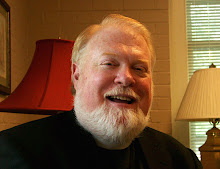Wednesday, June 11, 2008
Saturday, December 15, 2007
THE COST OF SIN
"How amazing that sin cost Jonah both money and effort; he paid the fare for the journey to accomplish his sin. As for grace, we obtain it free. It is amazing that we toil for our own hurt, expending money and effort. Perhaps it would have been a blessing to Jonah if he had not the money at the time to help him travel and disobey. When Jonah paid the fare of the ship, he suffered a double loss. He lost his money, his obedience and purity of heart." On Jonah H H Shenuda III
Tuesday, May 22, 2007
We Want The Way Easy
We live in an "instant" culture where everything is expected to be easy, fast, and convenient. The more we have the more we expect. In a never ending cycle we are over-stimulated and over-whelmed with facts figures and fantasies. A teacher of mine, the late Rabbi Edwin Friedman, used to say that in the late 20th century, "Data was a form of substance abuse."
What does this have to do with Jonah? The part of the story that everyone remembers is that Jonah is swallowed by a fish/whale. Why? Why did God do this? Why three days? Someone has said that the smelly interior of the fish was Jonah's "timeout room". Time out -- a place to pull yourself together and prepare to take your act on the road. If you never knew that you had a problem (namely yourself) repentance and amendment of life couldn't take place. It is only when Jonah is up to his neck in seaweed and fish juice that he "gets it".
God created human beings radically free. He wants us to mature. Maturity comes by facing challenge not by plugging into some instant relief. So life is a laboratory and we do not have to get it right every time but we do have to keep trying. As the Big Book of Alcoholics Anonymous puts it, "it's about progress not perfection". We will not get it right every time but how quickly can we recover and continue on the way. Such leads to maturity if we are willing to learn from our experience. Such learning can lead to wisdom.
Nuke'em God
 "Reckoning Day" Philip Straub
"Reckoning Day" Philip StraubThose guilty as sin Assyrians repented, would you believe it? They escaped like cockroaches under a door. For the first time in record a prophet of YHWH was totally successful and Jonah was not pleased with with his sucess. He would have been much happier with Nineveh being Nuked. Fortunately, the God of Israel is not like Jonah.
Medieval Exegesis
 Saint Thomas Aquinas
Saint Thomas AquinasCheck the link above for an excellent short presentation on another way of looking at, learning from and taking nourishment thereof the Holy Scripture. JWS



